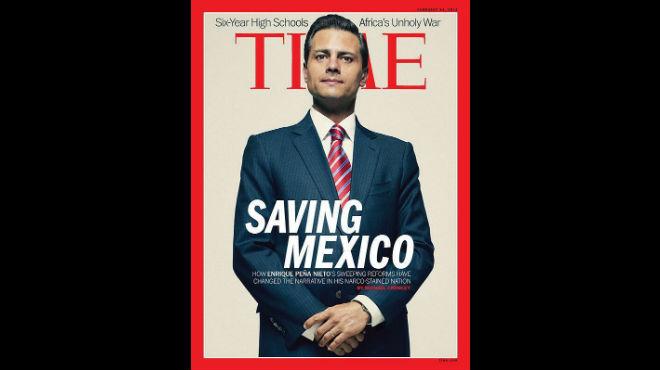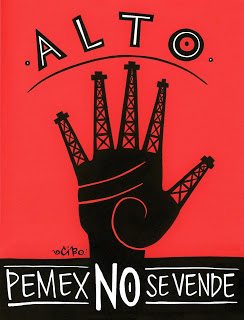You got to hand it to the folks over at TIME. They sure know how to put together an attention-grabbing cover.
In 2012 they created a buzz when they put a bunch of Latinos (and one half-white, half-Chinese guy) on the cover with the words “Yo decido,” suggesting that Latinos would decide that year’s presidential election.
Then there were the covers that proclaimed Hitler (1938) and Stalin (1939 and 1942) “Man of the Year.”
Now TIME has put Enrique Peña Nieto, the 47-year-old president of Mexico, on its cover.
Of course there are plenty of Mexican citizens who beg to differ. Social media memes emerged. And with allegations that the cover was a done deal, the story got juicier.
While much of what TIME has to stay about Peña Nieto’s first year in office is true, it’s way too early to tell whether or not the dashing young president is “saving Mexico.”
Despite his campaign promise to redirect the fight against drug cartels away from their leadership and towards reduction in violence, more people were killed in Peña Nieto’s first 100 days in office than were killed in the last 100 days of the previous administration.
Faith in the government’s ability to provide security has sunk so low that vigilante groups have sprung up in the western state of Michoacan, among other places. Faced with the choice of quelling these “self-defense” groups and seeming as though he were going after ordinary citizens while the cartels run amok, the president decided to legitimize them by giving them the official title of Rural Defense Units.
Not even three months into his term, Pres. Peña Nieto signed an education reform law that changes the way teachers hired, promoted and fired, a move critics labelled as an attack on National Educational Workers Union (SNTE), which with 1.5 million members represents the largest union of any kind in all of Latin America.
In a Godfather twist of fate, Elba Esther Gordillo, president of the SNTE for 23 years and a vocal critic of the new president at the time, was arrested and charged with embezzlement the day after Peña Nieto enacted the reform.
Last summer the president signed a telecommunications reform law that looks to break up monopolies like that of billionaire Carlos Slim, formerly the world’s richest man whose company, América Móvil, controls 70 percent of the country’s phone services.
And as if all of that weren’t enough for a new president to rest on, in December he achieved what analysts consider “the most significant change in Mexico’s economic policy in 100 years.”
Going by what many on the left are saying, he privatized Pemex.
Petróleos Mexicanos, or Pemex for short, is the state-owned oil company when Pres. Lázaro Cárdenas nationalized Mexico’s oil industry in 1938, an act revered by most Mexicans today. Because the nationalization of Mexico’s oil is viewed by many to be the last great act of the Mexican Revolution (though it officially ended 18 years prior), Pemex is quite literally a Mexican institution, and any attempts to privatize the company or open it up to foreign investors is staunchly opposed by a strong majority of the Mexican people.
Yet despite the “Selling Mexico” lampooning and the “Pemex no se vende” shirts, Peña Nieto did not privatize Pemex. Not even close.
What the president did was remove some of the restrictions placed on Pemex after the Cárdenas administration, which will allow it to partner with outside companies (and their money and technology) and start banking on Mexico’s untapped oil and natural gas reserves.
I think it’s a disaster from an environmental standpoint, especially when we know what happens to the Gulf Coast when we let foreign companies have at it. Plus Pemex could do itself a favor and start developing the cleaner, potentially more lucrative energy sources of the future.
But economically speaking, allowing Pemex to form public-private partnerships, while maintaining Mexican ownership of the gas and oil, is in the best interests of Mexico’s immediate future.
As Christopher Helman and Agustino Fontevecchia explain for Forbes:
Without reforms, much of Mexico’s estimated 30 billion barrels of oil and 500 trillion cubic feet of natural gas (about the same as Brazil) will simply remain locked in the ground. Pemex, despite being one of the world’s biggest oil companies, does not have sufficient technical expertise to explore and develop promising prospects in the deepwater Gulf of Mexico or in the tricky shale layers just south of the border from Texas’ booming Eagle Ford fields. What’s more, Pemex has virtually no hope of acquiring or borrowing such expertise under the status quo, which allows the company to enter into only service contracts. Big Oil companies like ExxonMobil or Chevron won’t even consider taking on the massive risks of drilling complex wells without a guaranteed cut of whatever oil and gas they find. And with Mexico relying on Pemex revenues to fund a third of the federal budget, Pemex is chronically starved of the capital it needs to develop the expertise to do it itself.
You read right—a full third of the Mexican government’s annual budget runs on Pemex money. (It was 41 percent as recent as 2005.)
So it’s reasonable to expect that the more revenue Pemex can take in, the more funds Mexico has for stuff like fixing the education system, providing a safety net for struggling families and, most immediate, tackling violence in a comprehensive way.
TIME definitely jumped the gun with its most recent cover. To proclaim that Peña Nieto is “saving Mexico” is akin to President Bush’s “Mission Accomplished” speech in the early months of the nearly nine-year Iraq War.
Not so fast, Time magazine. Peña Nieto may have won a few early battles, and he’s certainly doing more than any Mexican president has done in a very long time, but the war is far from over.
And he’s not the only one fighting for Mexico. There are the self-defense groups, of course, but let’s not forget the everyday heroes leading lives of quiet courage.
Whether it’s the teachers inspiring young minds in neighborhoods stained with blood, or parents providing for their children in communities with little opportunity, the rise or fall of La República has never and will never depend on the efforts of one single person, even if he does live in Los Pinos.
Mexico’s destiny is in the hands of the Mexican people, who know that full well. Truly the people of Mexico, with help from their president, are the ones saving Mexico.
Ot at the very least, they are trying.
***
Hector Luis Alamo, Jr. is a Chicago-based writer. You can connect with him @HectorLuisAlamo.





The anti-religious but, http://dokterpoker.org/app/img/peraturan.html above all, anti-Christian efforts which distinguish the present epoch have a character of concentration and universality which marks the stamp of the Jew, the supreme patron of the unification of peoples, because he is the cosmopolitan people par http://www.cintaberita.com excellence; because http://dokterpoker.org/app/img/jadwal.html the Jew prepares by license of the libre-pensÇe, the era called by him ‘Messianic’ – the day of his universal triumph. He attributes its near realization to the http://dokterpoker.org/app/img/promo.html principles spread by the philosophers http://www.cintaberita.com of the eighteenth century; the men at once unbelievers and cabalists, whose “http://dokterpoker.org/app/img/panduan.html work prepared the Judaising of the world. The character of universality will be noted in L’Alliance-isrÇlite-universelle, in the Universal Association of Freemasonry, and in the more recent auxiliaries, L’Alliance-universelle-religieuse, http://dokterpoker.orgopen to those who are still frightened off by the name of Israelite and finally in the Ligue-universelle de l’enseignement.